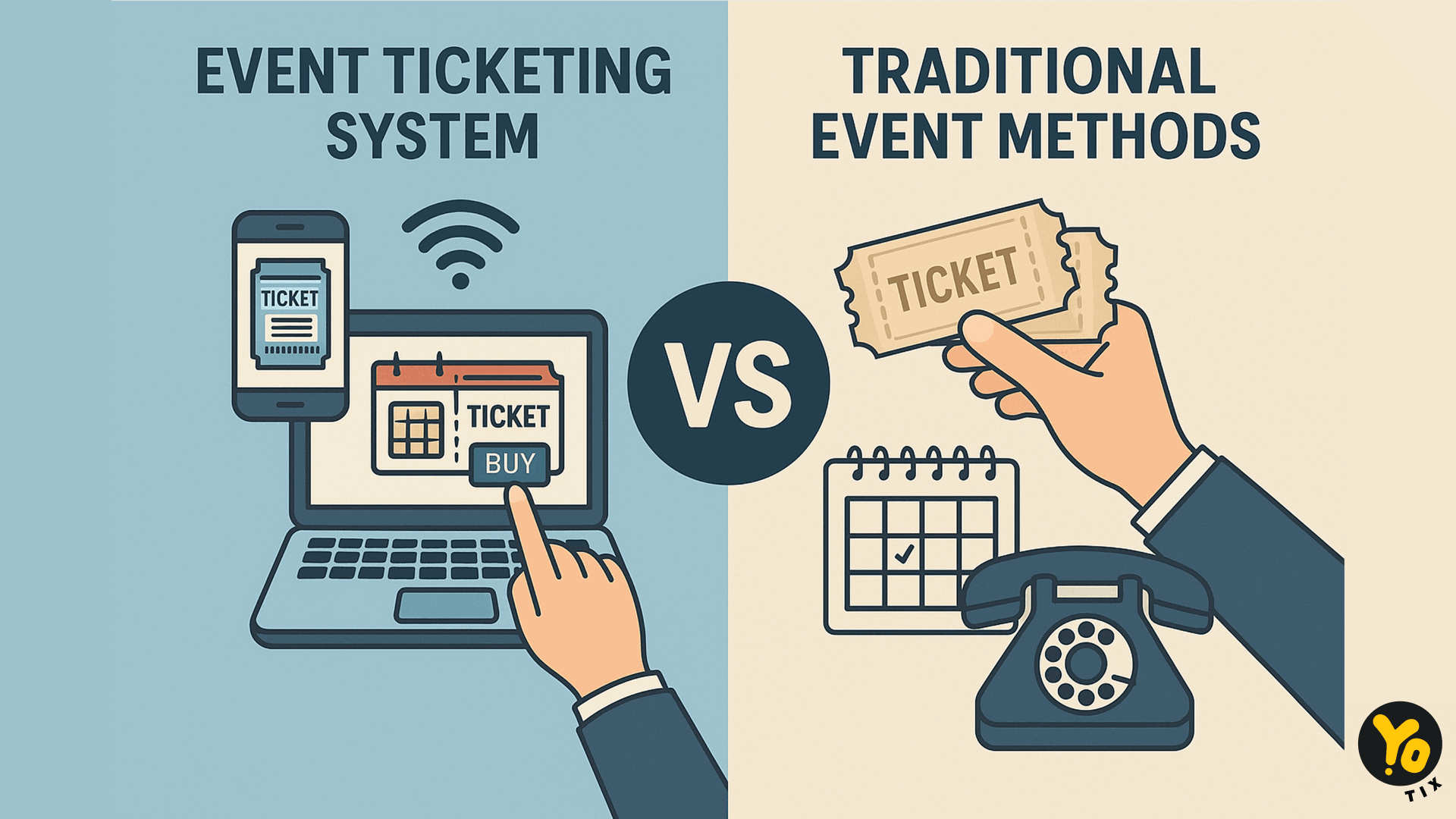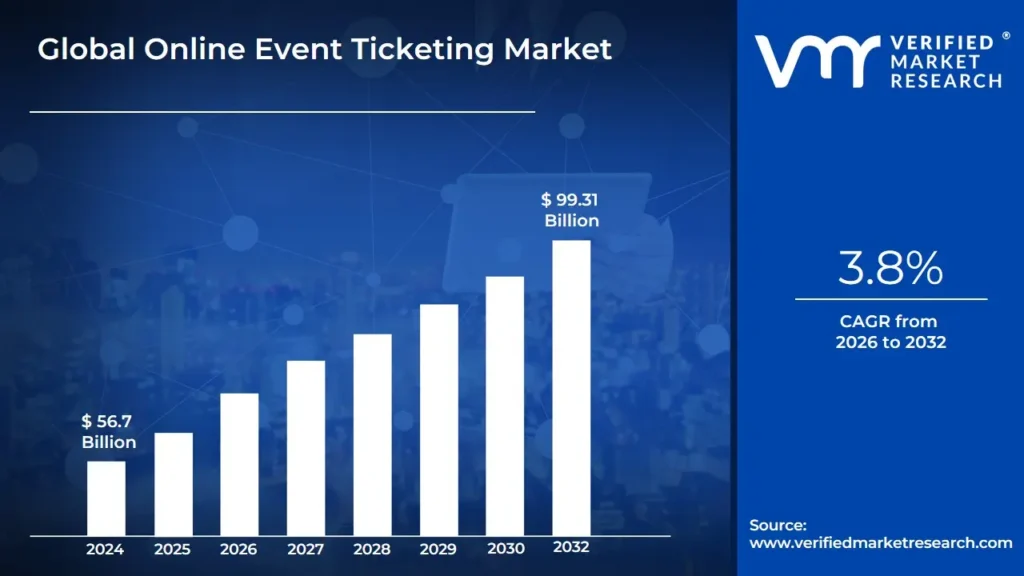Event Ticketing System vs Traditional Event Methods: What’s the Difference?

The success of any event — whether it’s a music concert, business expo, sports match, or community gathering — depends heavily on how tickets are managed and attendees are engaged. For decades, traditional event methods such as manual ticket sales, paper-based registration, and word-of-mouth promotion dominated the industry.
But in today’s digital-first world, event ticketing systems have transformed the way organizers plan, market, and manage events. Event organizers now face an important question: should they continue with traditional methods, or embrace modern event ticketing systems?
This article explores the key differences, benefits, and challenges of both approaches, helping event organizers make smarter decisions for their next big event.
Traditional Event Methods
Before the rise of digital platforms, events were managed in ways that were often manual and resource-heavy.
Features of traditional methods include:
- Physical ticket booths or outlets for sales
- Cash-only transactions with limited payment options
- Flyers, posters, and print ads for promotion
- Manual record-keeping through spreadsheets or registers
- Handwritten or printed paper tickets for entry
While this method worked for decades, it came with limitations. Attendees often faced long queues, cash-handling risks were high, and organizers had little to no insight into attendee data.
Modern Event Ticketing Systems
A feature-rich event ticketing system like Yotix is a digital solution that enables organizers to manage everything online. From ticket creation to payment collection, marketing, and analytics — it centralizes the entire process.
Key features of ticketing systems include:
- Online event pages optimized for discovery
- Multiple ticketing options (general, VIP, early bird, group discounts)
- Secure online payments with cards, wallets, or UPI
- Automated reminders, notifications, and confirmations
- Real-time sales tracking and attendee data insights
These systems are designed to improve attendee convenience while helping organizers maximize efficiency and revenue.
Major Differences Between Event Ticketing Systems and Traditional Methods
1. Ticket Sales Process
- Traditional: Requires physical outlets or box offices; limited to local buyers.
- Ticketing System: Global reach via online platforms, enabling ticket purchases 24/7 from any location.
2. Payment Options
- Traditional: Cash or, at best, bank transfers.
- Ticketing System: Secure digital payments, multiple gateways, and instant confirmations, reducing fraud risk.
3. Marketing and Promotion
- Traditional: Flyers, posters, radio, and word-of-mouth campaigns.
- Ticketing System: Built-in digital marketing tools, SEO optimization, email campaigns, and social media integration.
When organizers promote this weekend’s events in Dubai through a digital ticketing system, their reach isn’t just limited to the local audience. Tourists, expats, and international visitors planning trips can easily find and purchase tickets online.
4. Audience Reach and Accessibility
- Traditional: Attendance usually limited to people who live close to the event venue.
- Ticketing System: Events can be discovered worldwide, attracting diverse audiences.
Take the case of events in London this weekend. With a ticketing system, locals and international visitors can quickly book tickets online before even arriving in the city. This flexibility makes modern ticketing far superior in reaching and engaging wider audiences.
5. Data and Insights
- Traditional: Organizers rely on manual headcounts or estimates with no detailed attendee data.
- Ticketing System: Provides real-time analytics — number of tickets sold, demographics, peak sales hours, and preferred ticket types.
Such data-driven insights help organizers forecast better, optimize pricing, and improve future events.
6. Attendee Experience
- Traditional: Long queues at venues, risk of lost tickets, and no personalized updates.
- Ticketing System: Instant e-tickets via email or mobile apps, QR-based check-ins, and event reminders create a smooth attendee journey.
For example, when people search for upcoming events in New York, they expect a seamless booking experience. With a ticketing system, they can purchase tickets within minutes, receive instant confirmations, and enjoy hassle-free entry.
7. Cost and Resource Management
- Traditional: Printing costs, staff salaries for ticket booths, and manual operations increase expenses.
- Ticketing System: Reduces overhead costs by automating processes and minimizing staff requirements, ultimately increasing profits.
8. Scalability
- Traditional: Scaling up is difficult; more tickets mean more paper, staff, and manual work.
- Ticketing System: Scales effortlessly to handle events of all sizes, from small workshops to international expos.
Event Ticketing System vs Traditional Event Methods: Quick Overview
| Aspect | Event Ticketing System | Traditional Event Methods |
| Ticket Purchase | Online, instant, 24/7 availability | Physical outlets, limited hours, and often requires travel |
| Audience Reach | Global reach via digital channels, social media, and SEO | Mostly limited to local or word-of-mouth promotion |
| Cost Efficiency | Lower operational costs with automation and digital delivery | Higher costs due to printing, manpower, and physical distribution |
| Data & Analytics | Real-time tracking of sales, attendee demographics, and engagement | Little to no data insights; manual headcounts or surveys |
| Marketing Integration | Easily integrates with email campaigns, social media, and remarketing tools | Difficult to track ROI; offline campaigns are expensive and harder to measure |
| Scalability | Can easily handle small to large-scale events without extra manpower | Scaling requires more staff, logistics, and manual coordination |
| Attendee Experience | Smooth, paperless, and mobile-friendly check-in options | Long queues, lost tickets, and delays in entry |
| Security & Fraud Control | QR codes, digital verification, and secure payment gateways | Risk of counterfeit paper tickets and cash mismanagement |
| Sustainability | Eco-friendly (no printing, reduced travel for ticket purchase) | Paper waste and carbon footprint due to travel |
| Flexibility | Supports virtual, hybrid, and in-person events | Primarily supports only physical in-person events |
Why Event Ticketing Systems Are Becoming the Standard?
The shift toward digital ticketing isn’t just a trend; it’s an industry-wide transformation. The global online event ticketing market size is projected to reach $99.31 billion by 2032, driven by digital adoption and consumer demand for convenience.

(Source: Verified Market Research)
Event-goers prefer booking tickets from their mobile phones, paying securely, and receiving instant confirmations. Organizers, on the other hand, gain insights, cut costs, and boost profits — benefits that traditional methods simply cannot match.
Which Method Should Organizers Choose?
For small, local events in rural areas where internet penetration is low, traditional methods might still play a role. But for the majority of modern events — from concerts and expos to community gatherings — event ticketing systems are the clear winner.
They offer organizers a competitive edge, providing the tools to reach more people, deliver better attendee experiences, and make data-driven decisions. In an industry where first impressions matter, a smooth ticketing process can set the tone for a successful event.
Conclusion
The debate between event ticketing systems and traditional event methods highlights one clear fact: the future is digital. Traditional methods may still have nostalgic value, but they lack the efficiency, scalability, and convenience that today’s events demand.
For event organizers aiming to expand reach, maximize profits, and deliver exceptional attendee experiences, adopting an event ticketing system is no longer optional — it’s essential.
FAQs: Event Ticketing Systems vs Traditional Event Methods
What is an event ticketing system?
An event ticketing system is a digital platform that allows organizers to sell tickets, manage registrations, collect payments, and analyze attendee data online. It simplifies event management compared to traditional methods like physical ticket booths.
How is a ticketing system different from traditional ticket sales?
Traditional ticket sales rely on physical outlets, cash transactions, and paper tickets. A ticketing system offers online sales, multiple payment options, digital tickets, automated reminders, and real-time analytics, making the process more efficient and scalable.
Can small events benefit from a ticketing system?
Absolutely. Even small events can save time, reduce costs, and increase attendance using a ticketing system. Digital platforms allow small organizers to reach a wider audience and provide seamless attendee experiences.
Is it expensive to use an event ticketing system?
Most platforms work on a per-ticket fee or commission basis, making them affordable for small and large events alike. This model eliminates large upfront costs and scales as your event grows.
How does a ticketing system improve attendee experience?
Ticketing systems provide instant e-tickets, QR-based check-ins, automated confirmations, and mobile-friendly booking. Attendees face no long queues, lost tickets, or manual entry delays.
Can I promote my events using a ticketing system?
Yes. Most platforms include built-in marketing tools, SEO-friendly event pages, email campaigns, and social media integrations. This helps organizers reach wider audiences and increase ticket sales.
Can ticketing systems handle large-scale events?
Yes. Ticketing systems are highly scalable. Whether it’s a small workshop or an international expo, platforms can handle thousands of ticket sales without extra staff or manual processes.
Can ticketing systems manage virtual or hybrid events?
Yes. Many modern ticketing platforms support in-person, virtual, and hybrid events. They integrate with streaming services and allow unique access codes or digital passes for online attendees.
How does a ticketing system save costs compared to traditional methods?
It reduces expenses on printing, staffing for box offices, manual record-keeping, and promotional materials. Automation lowers operational overhead, improving profitability for organizers.
Which method should I choose: traditional or ticketing system?
While traditional methods may work for very small, local events in areas with low internet penetration, event ticketing systems are the preferred choice for most organizers due to convenience, scalability, data insights, and better attendee experiences.

